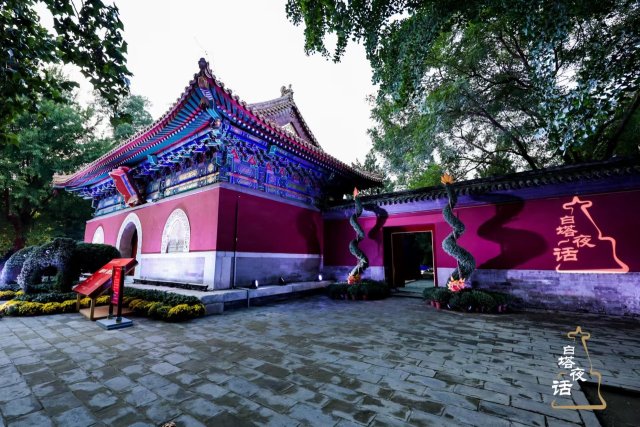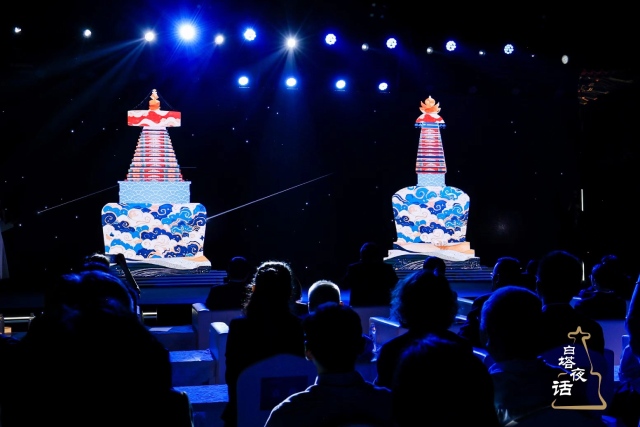.jpg)
2024 “White Pagoda Night Talks” Main Event Successfully Held in Beijing
To study and implement General Secretary Xi Jinping’s important instructions on strengthening the protection, inheritance, and utilization of cultural and natural heritage, the main event of the 2024 “White Pagoda Night Talks” cultural series, jointly organized by the Beijing Municipal Bureau of Culture and Tourism, the Beijing Municipal Administration of Cultural Heritage, and the Xicheng District Committee and Government, was held at Chanfu Temple in Beihai Park on the evening of September 24. Numerous experts, scholars, and cultural celebrities gathered in Xicheng, taking the successful application of the Beijing Central Axis for World Heritage status as an opportunity to discuss the protection of cultural heritage and the strategies for the development and inheritance of cultural context. Deputy Director of the National Cultural Heritage Administration Xie Bing, Deputy Secretary of the Beijing Municipal Committee Liu Wei, Member of the Standing Committee of the Beijing Municipal Government and Deputy Mayor, and Secretary of the Xicheng District Committee Sun Shuo delivered speeches. Member of the Standing Committee of the Beijing Municipal Government and Deputy Mayor Tan Xuxiang attended the event.
In the golden autumn of September, the night scene of Beihai Park was enchanting, with red walls and green trees complementing each other, and a gentle breeze bringing the faint fragrance of chrysanthemums. The event site featured a cultural light and shadow space, using holographic screens, laser fog gates, AI creation tools, and other devices to create a sense of time travel, giving the ancient architectural space a new look through technological and digital means, providing an immersive experience for the attending leaders and guests.
Inside Chanfu Temple, ancient architecture and modern art complemented each other, and the collision of Eastern and Western cultures was sublimated. The event began with a quartet performance by the National Centre for the Performing Arts Orchestra. The Xicheng cultural theme song “Love in Xicheng” was released for the first time, with a heartfelt performance by Wang Chong, a resident opera singer and tenor at the National Centre for the Performing Arts. The melodious tune lingered among the bricks and tiles, telling the roots of Xicheng culture and conveying the emotions of the city. It is understood that the theme song was launched for collection during last year’s “White Pagoda Night Talks” event, with enthusiastic participation from all sectors of society. This debut injects fresh vitality into the “White Pagoda Night Talks” cultural brand.

At the event, Shan Jixiang, Director of the Expert Committee of the China Cultural Relics Society, delivered a keynote speech titled “Achieving a Virtuous Cycle of Historical and Cultural Heritage Protection,” highly praising Xicheng District’s achievements in the protection of historical and cultural heritage. Shan Jixiang stated that a good state of historical and cultural heritage protection is to return to real society, showcase the charm of life, gather positive forces, benefit more people, expand the protection team, and form a truly virtuous cycle.
Under the White Pagoda, a unique meeting, a yearly conversation. The event opened a roundtable dialogue on the theme “When the City Meets Cultural Heritage.” Experts and cultural celebrities such as Gu Yucai, President of the China Cultural Relics Society, Wu Bihu, Director of the Tourism Research and Planning Center of the School of Urban and Environmental Sciences at Peking University, Ling Ming, President of the China Cultural Heritage Research Institute, Ye Nan, Director of the Historical and Cultural City Planning Institute of the Beijing Municipal Institute of City Planning and Design, and Jing Bo, Product Director of the Digital Culture Lab of Tencent SSV Sustainable Value Business Unit, gathered to explore the organic integration of cultural heritage protection and urban renewal from multiple dimensions such as cultural relics protection, cultural economy, and digital cultural creation, and to discuss the dialectical relationship between tradition and modernity, protection and development in the modernization process.
At the White Pagoda lighting ceremony on site, the attending leaders and guests pulled out White Pagoda-shaped bookmarks, lighting up the light columns one by one. The lights converged into a torch, and when the light reached the big screen, a Beijing swift appeared, flying across the ancient city’s spine, gradually lighting up the two White Pagodas of Beihai Park and Miaoying Temple. The light of the White Pagoda illuminated the splendid cityscape of ancient and modern times; the clear autumn night wrote a contemporary cultural chapter.

“White Pagoda Night Talks” is a distinctive cultural brand created by Xicheng District and one of the three major cultural salons in Xicheng District. This year marks the fifth year of the “White Pagoda Night Talks” cultural series. It is reported that the 2024 “White Pagoda Night Talks” cultural series consists of one main event and three parallel events. For the first time, a cultural live broadcast event was launched, inviting cultural celebrities to the live broadcast room on September 26 to talk about the development of Xicheng culture and special cultural tourism routes. A special “Xicheng Night Time” night tour guide was launched to provide citizens and tourists with diversified, immersive new formats, new scenes, and new experiences of nighttime leisure and entertainment, further boosting the night economy of Xicheng District and stimulating urban vitality. At the same time, to enhance the new experience of cultural consumption, a cultural market event is being held in and around the White Pagoda Temple from September 21 to 25, linking many star merchants in Xicheng District to provide citizens and tourists with a new experience of the integrated space of urban culture, commerce, and tourism.
Leaders of the four major groups of Xicheng District, the “Beijing Xicheng · Capital University Development Alliance,” and officials in charge from cultural units, technology enterprises, and cultural and museum venues in the district attended the event.